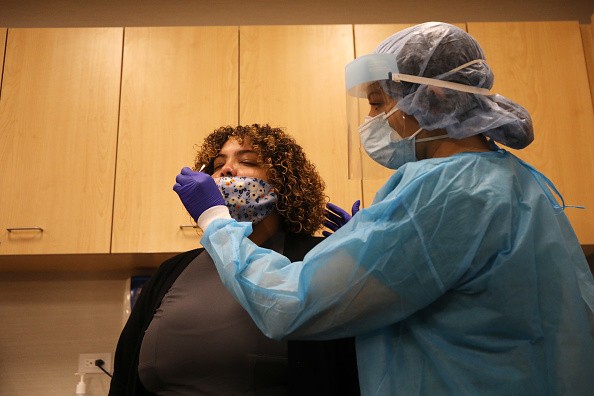COVID-19 Swab Test Reveals Undiagnosed Condition That Causes a Woman to Leak Brain Fluid

COVID-19 nasal swab test caused a woman to had brain fluid leak into her nose.
She was the first known person reported to have leakage of brain fluid into her nose after having a nasal swab test for the coronavirus, according to Business Insider. The unnamed woman is said to have an undiagnosed skull defect which prevented her bones to completely close, likely allowed the swab to prompt the symptoms like headache and runny nose.
On Thursday, the case was reported in the Journal JAMA Otolaryngology-Head & Neck Surgery. The report brought attention to the value of clinicians having proper training and patients' awareness in conducting COVID-19 tests. Tests for the disease are expected to ramp up to more than 6 million tests per day by the end of the year, authors wrote.
In the case study, the woman underwent a COVID-19 nasal swab test while she is in the hospital for elective surgery. After the test, she developed a headache, runny nose, and vomiting. The study reports that when the woman went back to the hospital, she complained of neck stiffness, metallic taste in her mouth, and light sensitivity.
Twenty years earlier, the women had a condition causing pressure in the brain, and she also had nasal polyps removed, Clinicians at the University of Iowa noted. They found a liquid coming from the woman's nose and confirmed for a marker of brain fluid. The brain scan revealed that she had an encephalocele; a rare condition wherein the bones of the skull didn't close completely.
The condition seemed to show, using past scans for comparison, that the woman had it since at least 2017, but the disease was undiagnosed. The COVID-19 nasal swab test likely was not the cause of the encephalocele itself; the doctors included. However, the test aggravated her condition, which allowed cerebrospinal fluid to leak out.
As of the writing of the case study, the woman underwent surgery to repair her skull. She remained in the hospital to safely drain the fluid and monitor any potential neurological side effects.
Less severe reactions after nasal swabs for COVID-19
A COVID-19 nasal swab test or PCR test detects if the virus is currently in an individual's body. The process is done by pushing a thin plastic nasal swab in about three to four inches along the base of the nose through the nostril.
The test aims to extract sputum, a material that is ejected through sneezing, coughing, spitting, and singing to test it for some of the coronavirus's genes.
Dr Shawn Nasseri, an ear, nose, and throat surgeon in Los Angeles, told Business Insider that for most, the procedure causes five to eight-second shack of unpleasantness. The test could also come with some throat pain because the swab reaches the tonsils or throat, or prompt people to sneeze.
However, minor numbers of people who underwent COVID-19 nasal swab tests had worse reactions. One survivor of COVID-19 disease previously told Business Insider that the test was "excruciating" and caused her to pass out.
The body's response due to a lack of blood flow to the brain can be preceded by pale skin, lightheadedness, tunnel vision, nausea, and clammy sweat, just like some people faint at the sight of blood.
Check these out:
COVID-19 Disease May Fall Men's Testosterone Levels, New Data Says
Brain-Eating Amoeba Found in Texas City's Water Supply, Residents Warned
Fauci Says Take Vitamin D If You're Deficient. How to Know If You Are?
Subscribe to Latin Post!
Sign up for our free newsletter for the Latest coverage!















